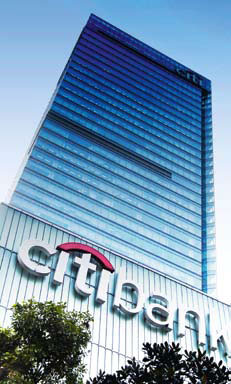The Middle East has only recently begun to feel the impact of the global downturn in earnest but, writes Robert Watsham of global headhunters, Odgers Berndtson, the region is well placed to take advantage of the upturn when it arrives.

The Middle East’s economies continue to register growth – although there is little sign of the business expansion and “frenzied trade activity” being hailed just 10 months ago. Almost three financial quarters went by before the Gulf States realised the global economic slowdown had hit them and was about to impact on their businesses.
As a headhunter who specialises in the world of global transaction banking, including the overall MENA region, it has been interesting to watch optimism turn to pessimism over an 18 month period. However, one thing sets the region apart from the rest of the world: a business mentality – “realism and determination” as described by one leading Gulf banker – that suggests it will trade out of the recession.
With oil at $150 per barrel a year ago, the Gulf Cooperation Council (GCC) states were anticipating continued economic growth. But the region is always cautious and expansion was planned carefully across certain sectors. China and India, meanwhile, were buying raw goods at an unprecedented rate with Dubai representing the hub of the trade process. However, all suddenly went quiet as oil prices dropped to around $50 per barrel.
Dubai suffered an overnight realignment: property prices went into freefall; unemployment increased sharply; expatriates began to pack up their lifestyles and move on. Fortunately, the Central Bank of the United Arab Emirates was quick to guarantee bank deposits and interbank lending, as well as shoring up liquidity by injecting much needed capital into the financial system. Large private equity firms publicly breathed a collective sigh of relief, while quietly calculating multibillion dollar paper losses. Many Ultra High Net Worth families felt, maybe for the first time, the unhealthy draught of a recession.
Recent months have seen turmoil in the Kuwait Stock Exchange, and the country has also witnessed the recapitalisation of Gulf Bank. The situation prompted the government to step in to support the economy with a financial stability law, introduced to assist Kuwait overcome the effects of the global financial crisis. On a more positive note, yesterday’s enemy is tomorrow’s friend; Iraq sits to Kuwait’s northern border and is oil rich – the pickings are potentially enormous if this small state can make friends with its bigger northern neighbour.
Saudi Arabia now has a seat at the top table of G7 states. However, it has not been immune to the deepening global recession. Indeed, at the time of writing, a major holding company has defaulted, leaving the banks and rating agencies adjusting their estimates downwards. With the collapse of oil prices sending the Kingdom into deficit, the Saudi Arabian Monetary Authority has had to oversee an injection of capital into several of the country’s banks. Whilst some of the lessons learned from Dubai’s building boom have been passed on, the stimulus of building four economic cities in the sand may take longer than planned to be realised. However, the underlying reasons are sound: to diversify the kingdom’s reliance on hydrocarbons and related industries; and to safeguard jobs and housing for a growing population.
Bahrain, meanwhile, has continued to try and attract new institutions to the kingdom and is well situated as a global Islamic banking hub. It is, however, facing the same challenges as the entire Gulf, with inward investment drying up and major infrastructure projects being put on hold. Two of the island’s major banks have suffered from their wholesale banking structures and have given notice of a push into the consumer finance world.
So where does that leave the global transaction banking sector? Falling interest rates have had a negative impact, but it is still growing and achieving increased visibility at board level, both in-house and with global clients who need to know where their cash is and how it is being managed. It is now a highly professional business, with a far larger part to play at this stage of a financial crisis and with scarce liquidity. An interesting development in the market has seen the Association of Corporate Treasurers set up a branch in the Middle East designed to speed up professionalisation of the business.
Monetary union and the single Gulf currency are high on many agendas, with Riyadh chosen as the host city for a new GCC Central Bank. Whilst some countries actively oppose any union, the signs overall are looking good as Gulf officials challenge the global financial downturn giving added impetus to efforts to improve monetary policy. This has thrown the need for a common currency into focus. The premier transaction banks have been in the region for a number of years. Several have located key personnel in the main countries, whilst others have quietly hired senior business managers who know the entry points to success.
Technology is being leveraged to allow clients (both corporates and financial institutions) to handle cash management and trade finance more efficiently around the region. Risk management and compliance is high on the agenda. And borrowers are increasingly turning to export credit agency (ECA) financing to underpin new or stalled infrastructure projects. Correctly priced trade related deals – back to the trading mentality of the region – may well be the catalyst that unlocks the source and supply of much needed funding.
From a headhunter’s perspective, these are not entirely happy times. However, the war for talent is still ongoing. The market is turning and banks must not look just at what is available in the bargain basements on the street.
When an economy goes into reverse, it exposes those who cannot implement a strategy for recovery. Well-run financial institutions now need to invest in people for the future – those who can help the MENA region evolve as a financial base for global and regional companies as they set up or expand.
In short, financial integration will work in the GCC states and the region will recover – maybe quicker than certain other more mature markets. Business confidence is fragile, but there are signs it is slowly returning. The region has learned from the mistakes of others and is experiencing a substantial correction. But that correction will be followed by a bounce back. The Middle East is an area that is always quick to take advantage of potential opportunities.
 Cash And Trade Magazine For Cash and Trade professionals in the Middle East
Cash And Trade Magazine For Cash and Trade professionals in the Middle East


